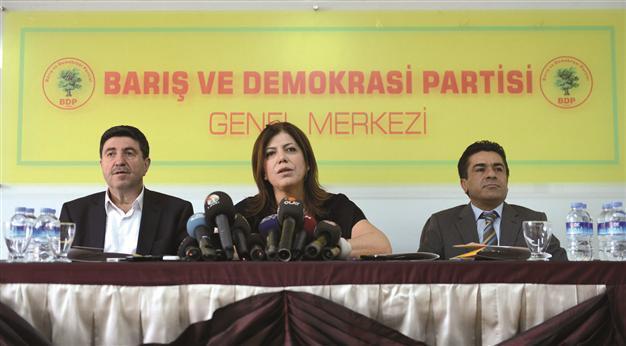Racism allegations mar charter drafting session
ANKARA

Peace and Democracy Party’s Deputy Co-Chair Meral Danış Beştaş (C) speaks at yesterday’s press conference. AA photo
Parliament’s Constitution Conciliation Commission is having a hard time reconciling long-standing differences in formulating the right to education in mother tongue and defining citizenship, as surfaced during skirmishes among lawmakers in a meeting on Sept. 18.As the members of the commission were debating the citizenship article, a conflict on racism and fascism became evident between the Peace and Democracy Party’s (BDP) Deputy Co-Chair Meral Danış Beştaş and the Nationalist Movement Party (MHP) deputy Oktay Öztürk.
Beştaş reacted against Öztürk’s alleged approval of late Justice Minister Mahmut Esad Bozkurt’s words belittling everybody other than Turks.
“The ones who are not Turkish have only one right in this country, that is the right to be a slave,” Bozkurt had said during single-party rule under İsmet İnönü in the early years of Republic, which Öztürk reportedly endorsed by saying, “He said it right.” Beştaş deemed Öztürk’s remark “racist and fascist.”
Turk definition rift
Meanwhile, deputies of the main opposition Republican People’s Party (CHP) Rıza Türmen and Süheyl Batum had a row over the definition of citizenship.
Türmen argued that the infamous Article 301 of the Turkish Penal Code (TCK) governing “insult against Turkishness” certifies that the term “Turk” does not include other ethnic identities.
“There are cases against those insulting Turkishness, but not against those insulting Kurds. Based on this, it is understood that in the definition of citizenship, the term ‘Turk’ does not include all identities. There must be clarity on this,” Türmen said.
In response, Batum argued, “The definition of Turkish citizenship does not mean that ‘Kurds do not live here, Arabs do not live here, Circassians do not live here, only those belonging to a Turkish strain, Turkish race live here.’ This is a supra-identity.”
In a press conference Beştaş held with two other BDP deputies Altan Tan and Bengi Yıldız in the party’s headquarters on Sept. 19, they urged Kurdish deputies within other political parties to stand up for their rights. “We invite the deputies within other parties, starting with Kurdish deputies in both the AKP [the ruling Justice and Development Party] and the CHP, to take a stance against their parties that reject their mother tongue, their identities, to express their views, to support and give a voice to this,” Beştaş said.
Similarly, Tan expressed that if these deputies, especially the Kurdish ones, did not stand up from within their parties, they would be betraying their own people.
“What must be done today is that democrat deputies and especially the Kurdish deputies must stand up from within their parties to ask for their rights,” Tan said, warning that if they did not, they would be accomplices of a crime.
CHP clarifies position on mother tongue
ANKARA - Hürriyet Daily News
Speaking at a press conference on Sept. 19, party spokesperson Haluk Koç defined the party’s official position as follows: “The language of education is Turkish. The students whose mother tongue is not Turkish have the right to learn and use their own language, in addition to education in Turkish. The state takes the necessary precautions for the effective use of this right.”
The breakthrough came after CHP leader Kemal Kılıçdaroğlu stepped in and resolved the ongoing internal disagreement at a meeting held on Sept. 18.
The CHP therefore appears to have softened its position on not allowing education in any language other than Turkish, replacing it with the phrase, “The language of education is Turkish.”
















